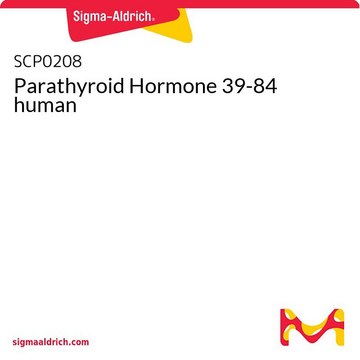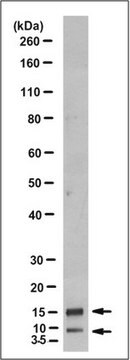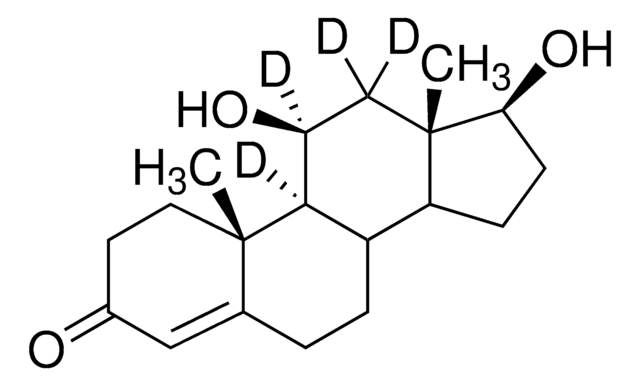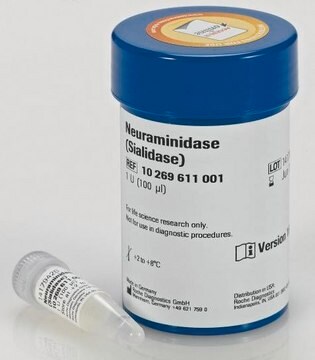H9148
Hypercalcemia of malignancy factor fragment 1-34 amide human
≥97% (HPLC)
Synonym(s):
Ala-Val-Ser-Glu-His-Gln-Leu-Leu-His-Asp-Lys-Gly-Lys-Ser-Ile-Gln-Asp-Leu-Arg-Arg-Arg-Phe-Phe-Leu-His-His-Leu-Ile-Ala-Glu-Ile-His-Thr-Ala-NH2, PTHrP (1-34) amide, Parathyroid hormone-related protein (1-34) Amide
About This Item
Recommended Products
Quality Level
Assay
≥97% (HPLC)
form
solid
technique(s)
drug transporter assay: suitable
color
white
UniProt accession no.
storage temp.
−20°C
SMILES string
CC[C@H](C)[C@H](NC(=O)[C@H](CC(C)C)NC(=O)[C@H](Cc1c[nH]cn1)NC(=O)[C@H](Cc2c[nH]cn2)NC(=O)[C@H](CC(C)C)NC(=O)[C@H](Cc3ccccc3)NC(=O)[C@H](Cc4ccccc4)NC(=O)[C@H](CCCNC(N)=N)NC(=O)[C@H](CCCNC(N)=N)NC(=O)[C@H](CCCNC(N)=N)NC(=O)[C@H](CC(C)C)NC(=O)[C@H](CC(O)=O)NC(=O)[C@H](CCC(N)=O)NC(=O)[C@@H](NC(=O)[C@H](CO)NC(=O)[C@H](CCCCN)NC(=O)CNC(=O)[C@H](CCCCN)NC(=O)[C@H](CC(O)=O)NC(=O)[C@H](Cc5c[nH]cn5)NC(=O)[C@H](CC(C)C)NC(=O)[C@H](CC(C)C)NC(=O)[C@H](CCC(N)=O)NC(=O)[C@H](Cc6c[nH]cn6)NC(=O)[C@H](CCC(O)=O)NC(=O)[C@H](CO)NC(=O)[C@@H](NC(=O)[C@H](C)N)C(C)C)[C@@H](C)CC)C(=O)N[C@@H](C)C(=O)N[C@@H](CCC(O)=O)C(=O)N[C@@H]([C@@H](C)CC)C(=O)N[C@@H](Cc7c[nH]cn7)C(=O)N[C@@H]([C@@H](C)O)C(=O)N[C@@H](C)C(N)=O
InChI
1S/C180H288N58O47/c1-23-94(16)141(174(282)208-99(21)147(255)210-116(51-55-137(247)248)156(264)235-143(96(18)25-3)176(284)231-128(72-107-79-197-87-206-107)170(278)238-144(100(22)241)177(285)207-98(20)145(186)253)236-169(277)121(65-92(12)13)222-164(272)125(69-104-76-194-84-203-104)228-165(273)126(70-105-77-195-85-204-105)226-160(268)120(64-91(10)11)220-161(269)123(67-102-41-30-27-31-42-102)224-162(270)122(66-101-39-28-26-29-40-101)223-152(260)112(47-38-60-200-180(191)192)213-150(258)110(45-36-58-198-178(187)188)212-151(259)111(46-37-59-199-179(189)190)214-157(265)117(61-88(4)5)221-168(276)130(74-139(251)252)229-154(262)114(49-53-134(185)243)217-175(283)142(95(17)24-2)237-172(280)132(82-240)232-149(257)109(44-33-35-57-182)209-135(244)80-201-148(256)108(43-32-34-56-181)211-167(275)129(73-138(249)250)230-166(274)127(71-106-78-196-86-205-106)227-159(267)119(63-90(8)9)219-158(266)118(62-89(6)7)218-153(261)113(48-52-133(184)242)215-163(271)124(68-103-75-193-83-202-103)225-155(263)115(50-54-136(245)246)216-171(279)131(81-239)233-173(281)140(93(14)15)234-146(254)97(19)183/h26-31,39-42,75-79,83-100,108-132,140-144,239-241H,23-25,32-38,43-74,80-82,181-183H2,1-22H3,(H2,184,242)(H2,185,243)(H2,186,253)(H,193,202)(H,194,203)(H,195,204)(H,196,205)(H,197,206)(H,201,256)(H,207,285)(H,208,282)(H,209,244)(H,210,255)(H,211,275)(H,212,259)(H,213,258)(H,214,265)(H,215,271)(H,216,279)(H,217,283)(H,218,261)(H,219,266)(H,220,269)(H,221,276)(H,222,272)(H,223,260)(H,224,270)(H,225,263)(H,226,268)(H,227,267)(H,228,273)(H,229,262)(H,230,274)(H,231,284)(H,232,257)(H,233,281)(H,234,254)(H,235,264)(H,236,277)(H,237,280)(H,238,278)(H,245,246)(H,247,248)(H,249,250)(H,251,252)(H4,187,188,198)(H4,189,190,199)(H4,191,192,200)/t94-,95-,96-,97-,98-,99-,100+,108-,109-,110-,111-,112-,113-,114-,115-,116-,117-,118-,119-,120-,121-,122-,123-,124-,125-,126-,127-,128-,129-,130-,131-,132-,140-,141-,142-,143-,144-/m0/s1
InChI key
YUTJVTMXUNTCEG-WBTWNKCNSA-N
Gene Information
human ... PTHLH(5744)
Amino Acid Sequence
Biochem/physiol Actions
Other Notes
Storage Class Code
11 - Combustible Solids
WGK
WGK 3
Flash Point(F)
Not applicable
Flash Point(C)
Not applicable
Personal Protective Equipment
Certificates of Analysis (COA)
Search for Certificates of Analysis (COA) by entering the products Lot/Batch Number. Lot and Batch Numbers can be found on a product’s label following the words ‘Lot’ or ‘Batch’.
Already Own This Product?
Find documentation for the products that you have recently purchased in the Document Library.
Our team of scientists has experience in all areas of research including Life Science, Material Science, Chemical Synthesis, Chromatography, Analytical and many others.
Contact Technical Service





